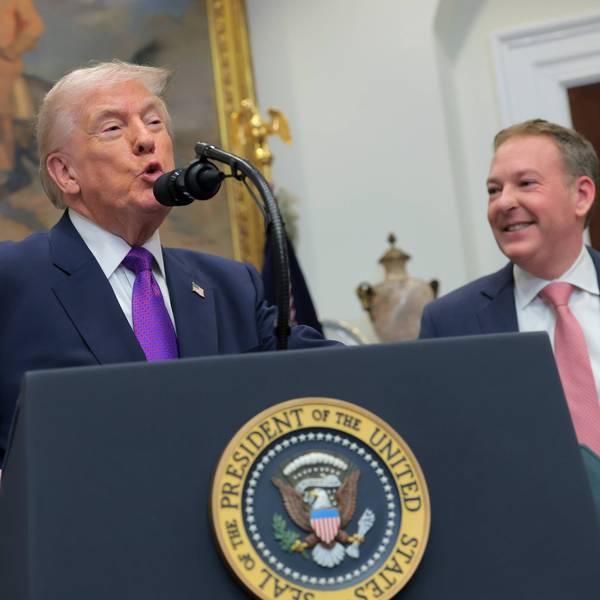On Tuesday, President Donald Trump signed an executive order that reportedly eliminates flood-risk standards for federally funded public infrastructure projects--in a purported effort to expedite the approval process for projects such as highways and bridges, as part of his $1 trillion infrastructure plan that's been criticized for its reliance on private developers.
"This is yet another outrageous example of Trump's insistence on putting corporate interests ahead of people's health and safety."
--Alex Taurel, League of Conservation Voters
Although details of Trump's order were not immediately made public, at a press conference this afternoon, the president called U.S. infrastructure a "massive self-inflicted wound on our country," and said there would no longer be "one job-killing delay after another."
Reuters, New York Times, and the Washington Post reported that Trump's order "revoked an Obama-era executive order that required strict building standards for government-funded projects to reduce exposure to increased flooding from sea level rise and other consequences of climate change."
The Obama-era risk-management standards "required that builders factor in scientific projections for increased flooding and ensure projects can withstand rising sea levels and stronger downpours," Reuters reported.
When Obama signed the order in 2015, he said the goal was to "improve the resilience of communities and federal assets against the impacts of flooding," which are "anticipated to increase over time due to the effects of climate change and other threats."
Just last month, "scientists released findings that up to 668 U.S. communities could face chronic flooding from rising sea levels by the end of the century," Common Dreams reported. More than 90 U.S. communities are already grappling "unmanageable" flooding that is disrupting "people's routines, livelihoods, homes, and communities."
Obama's order required all federal agencies to apply risk-management standards to public infrastructure projects, but did not regulate private development. It allowed federal agencies to select from three options, as the Times explained:
- They could use the best available climate change science;
- They could require that standard projects like roads and railways be built two feet above the national 100-year flood elevation standard and critical buildings like hospitals be built three feet higher;
- They could require infrastructure be built to at least the 500-year floodplain.
Even though a White House official told the Post Trump's order will not prevent "state and local agencies from using a more stringent standard if they choose," environmentalists swiftly condemned Trump's decision to revoke the flood risk provisions.
"This order will put people throughout the country at risk by allowing developers to ignore potential hazards while muzzling the public's ability to weigh in on potentially harmful projects near their homes," Alex Taurel, deputy legislative director for the League of Conservation Voters, told Bloomberg. "This is yet another outrageous example of Trump's insistence on putting corporate interests ahead of people's health and safety."
"Eliminating this requirement is self-defeating; we can either build smarter now, or put taxpayers on the hook to pay exponentially more when it floods. And it will," Rafael Lemaitre, former director of public affairs at FEMA who worked on the Obama-era order, told Reuters. Trump is undoing "the most significant action taken in a generation" to safeguard U.S. infrastructure, Lemaitre added.
"This is just another example of this administration trying to undo everything the Obama administration did, whether it makes any sense or not," William Robert Irvin, president the conservation group American Rivers, told the Post. "Directing federal agencies to ignore the impact of flooding in spending federal dollars is just a complete waste of taxpayer money and continues this administration's head-in-the-sand approach to the perils of climate change, which is resulting in increased flooding."
Author and 350.org co-founder Bill McKibben had this to say:
Some conservative legislators and groups also condemned the decision, pointing to the long-term financial consequences of spending tax dollars on construction in flood-prone areas.
Eli Lehrer, president of the R Street Institute, which advocates for free-market solutions to climate change, called Trump's decision "fiscally irresponsible" and "a disaster for taxpayers."
"We are going to be spending and wasting taxpayer dollars to build stuff in areas where it simply shouldn't be built," Lehrer told Bloomberg.
Rep. Carlos Curbelo, (R-Fla.) criticized the president's new order, saying in a statement:
When you're on the front lines like South Florida, we know the importance of having more resilient building codes to protect our infrastructure, especially when taxpayer dollars are used....[Trump's order is] irresponsible and it will lead to taxpayer dollars being wasted on projects that may not be built to endure the flooding we are already seeing and know is only going to get worse.




